 Myanmar’s police Capt. Moe Yan Naing walks during trial of two Reuters journalists Wa Lone and Kyaw Soe Oo at the court in Yangon, Myanmar Friday, April 20, 2018. (AP Photo/Thein Zaw)
Myanmar’s police Capt. Moe Yan Naing walks during trial of two Reuters journalists Wa Lone and Kyaw Soe Oo at the court in Yangon, Myanmar Friday, April 20, 2018. (AP Photo/Thein Zaw)
A police officer in Myanmar who blew the whistle on his colleagues’ plot to “entrap” two Reuters journalists has been imprisoned, a police spokesperson told news agency AFP. Deputy police major Moe Yan Naing was summoned as a prosecution witness earlier in April in connection with a case against the two journalists who are currently in police custody for possessing classified documents. If convicted, they could be sentenced for up to 14 years.
During a pre-trial hearing, Naing had shocked the courtroom when he revealed that his colleagues’ officers were ordered by a senior officer to “get” journalist Wa Lone by giving him classified material at a meeting. Lone and his co-worker Kyaw Soe Oo were taken into custody in December after the meeting took place. The case has since received worldwide attention over the shrinking press freedom in Myanmar as fears grow over the fate of the two reporters. The officer’s statement against his own force was an extremely rare instance of a member of the police openly taking on senior officials.
On Monday, a police spokesperson said that the officer was being imprisoned for violating the police disciplinary Act, an accusation levied against him before he made the statement in court. Police sources said he was sentenced before he gave his testimony. “He was sentenced because he told others about information concerned with the police force without permission,” Police Colonel Myo Thu Soe told AFP, adding, “He was found to have breached the police disciplinary Act.”
Moe Yan Naing’s wife told AFP that she was told about her husband’s sentencing last night. “The police told me yesterday (Sunday) evening that he had been sent to Insein prison to face a year-long sentence,” Tu Tu said. She and her children were evicted from their home in the police housing in the national capital in less than 24 hours after the officer made the declaration in court on April 20. The police force, however, has denied that a connection exists between Naing’s testimony and the eviction. A spokesperson termed it as a “coincidence”.
 FILE – In this combination of Dec. 27, 2017, file photos, Reuters journalist Thet Oo Maung, also known as Wa Lone, left, and Kyaw Soe Oo, also known as Moe Aung, are pictured outside court near Yangon, Myanmar. (AP Photos/Thein Zaw, File)
FILE – In this combination of Dec. 27, 2017, file photos, Reuters journalist Thet Oo Maung, also known as Wa Lone, left, and Kyaw Soe Oo, also known as Moe Aung, are pictured outside court near Yangon, Myanmar. (AP Photos/Thein Zaw, File)
The arrest of the Reuters journalists had highlighted failing democracy in Myanmar, which is waking up from decades of military rule. The case has received international media and diplomatic attention.
The journalists were investigating the role of security forces in the alleged killings of ten Rohingya men in the northern Rakhine state, currently witnessing a mass exodus to the tune of 700,000 Rohingya Muslims after an army crackdown. The United Nations has called the military action in the region “ethnic cleansing” of the minority community.
(With AFP inputs)